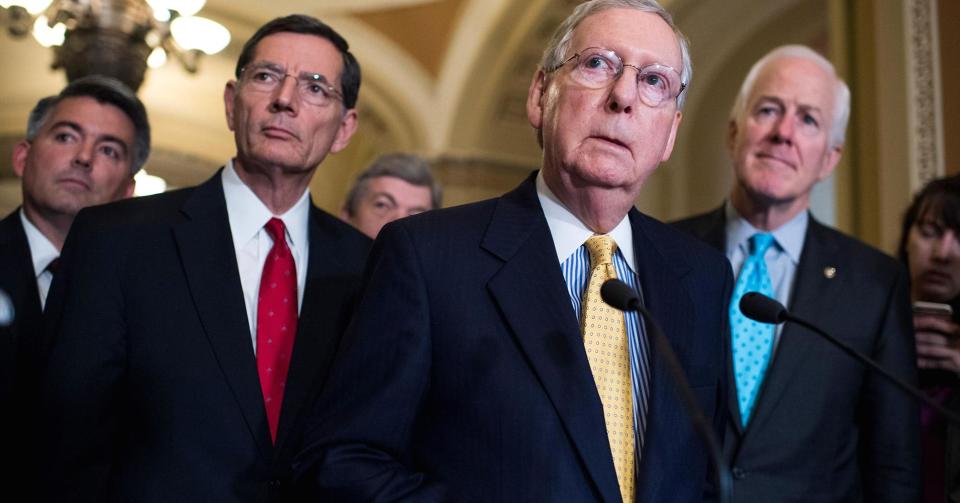Op-Ed: Here's what happens to Obamacare if GOP can't pass 'secret' health bill

Version 2.0 of the American Health Care Act – AHCA – is gaining steam, even as the process in the Senate has been criticized for its secrecy. Still, it remains to be seen whether Republicans will be able to garner the votes needed to pass the bill meant to replace the Affordable Care Act.
Last month President Trump praised the House version of the AHCA, yet last week, he called it "mean" in a meeting with Senators who are working on their own version.
At this point, calling the fate of health-care policy unpredictable is an understatement. A lot has been said about what happens if the AHCA passes, but given all the uncertainty, consumers should be asking themselves asking a different question:
What happens if Obamacare remains the law of the land?
The ACA has its issues, and if it stays in place those issues will be aggravated by an administration that doesn't support it – and actively wants it to fail. If the AHCA doesn't pass, here's what consumers will have to contend with based on the actions the Trump administration may – or may not – take.
What happens to government subsidies?
The health insurance story of 2016 was big premium increases, as rates rose an average of 22 percent. But the truth is that most people didn't feel the full effect of these rate increases thanks to government subsidies. This year, the big question will be whether or not the Trump administration will continue its commitment to those subsidies. This will have a huge impact on what consumers will end up paying for their health insurance.
North Carolina is a perfect example, where uncertainty around one type of subsidy called cost-sharing-reductions (CSRs) is already threatening a price spike. Blue Cross Blue Shield has proposed two different scenarios based on whether or not CSRs will be continued: With CSRs, rates will increase statewide by just 8.8 percent, but without the subsidies, rates would likely increase by an average of 22.9 percent. Similarly, rate increases in Pennsylvania could range from under 9 percent to over 20 percent depending on federal support.
What happens in markets where insurers have pulled out?
The cost of health care doesn't just affect consumers. It also impacts insurers. We've already seen a flurry of insurer withdrawals across the country, leaving 47 counties, and over 38,000 people, without Obamacare coverage options. Former HealthCare.gov CEO Kevin Counihan worked to ensure coverage in all counties in years past, but the current administration hasn't made an effort to do so (and considering their plan is to do nothing to save Obamacare , that's not surprising).
What happens to consumers if no insurer steps in to provide plans in these counties? Individual politicians are working to come up with backup plans.
Lamar Alexander and Bob Corker are proposing allowing residents of "empty shelf counties" to purchase approved plans from elsewhere in the state. Claire McCaskill wants to allow people to buy from the same Washington, D.C.-based exchange members of Congress use now.
It remains to be seen how these would be implemented and the choices available to consumers shopping outside their county – just another question mark as we head toward open enrollment. Consumers will have to get educated on their county's options and expanded offerings, adding another wrinkle to the shopping process.
How states could take the lead on health-care reform
One of the stickiest negotiating points in AHCA 2.0 has been whether the Medicaid expansion that occurred under Obamacare should be rolled back and, if so, how quickly. That's why it's surprising to see further Medicaid expansion on the table to potentially solve the problems of rising costs and fewer coverage options.
Policymakers in Nevada are proposing a "Medicaid-for-all" plan in which people could buy into the state's Medicaid program, and those with ACA tax credits could use them for Medicaid coverage.
This is an interesting proposal, but one that wouldn't provide an immediate fix for the majority of consumers: it still has some hurdles to overcome before it becomes law, it wouldn't go into effect until January 2019, and Nevada is currently the only state seriously considering such a program.
Still, it signals that states may be willing to implement potential alternatives if the ACA stays in place with limited federal support. It may also be the forerunner of similar proposed health-care expansions, like California's "Medicare-for-all" single payer plan. If the Trump administration doesn't take steps to fix existing Obamacare issues, it will become increasingly important for consumers to watch emerging alternatives closely.
The Senate is hoping to vote on the new AHCA before the July 4th recess, despite Democrats protests. If it passes, we'll have a whole new slate of questions about its impacts as the House and Senate negotiate a final bill that would still face hurdles before becoming law.
Based on everything we've heard, under a replacement bill Medicaid expansion would likely be rolled back, people with pre-existing conditions would not have the same coverage protections and an estimated 23 million people could lose coverage.
But if it doesn't pass, consumers will still need to be prepared for major speed bumps come open enrollment this fall. If the current law isn't fully supported with all available resources, consumers could face an uncertain future, as costs rise and coverage options decrease in a destabilized insurance market even with the ACA in place.
Commentary by Jennifer Fitzgerald, the CEO and co-founder of PolicyGenius, an independent digital insurance company for consumers. Previously, she was a junior partner at McKinsey & Company where she advised Fortune 100 financial services companies on marketing and strategy. She is a graduate of Columbia Law School and Florida State University. Follow her on Twitter @jenlfitzgerald.
For more insight from CNBC contributors, follow @CNBCopinion on Twitter.
More From CNBC

